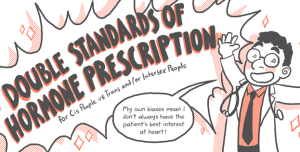But increasingly, there are fees in the criminal justice system itself. In over 40 states, costs of a DNA, or drug test, parole, a public defender, even jail time can fall to the supposed offender. It’s even got a name: Offender Funded Justice. If you can’t pay, you go to jail, all while your debts increase.
I spoke to Sam Brooke of the Southern Poverty Law Center who told me about a 50-year-old woman who couldn’t afford car insurance, so she got ticket after ticket for driving on a suspended license. She, of course, couldn’t pay those tickets either, and eventually racked up so many fines that she owed $2,700. But since there was no public transportation in her town, she had no other choice. Eventually, she decided to lose the car and just walk five miles to work. Still, though, she was sentenced to 30 days in prison.
Sam Brooke: The vicious cycle that happens is people get caught in the system and really get trapped in the system.
Francesca: But it gets worse, because private companies are getting in on the action, especially after the 2008 financial crisis, cities, and states, and counties, are increasingly outsourcing these cases to private firms to cut costs.
Sam Brooke: They’re called “private probation companies.” What they really are is they’re effectively glorified debt collectors. They are usually simply there to try to help collect the fines and costs owed, in particularly trying to help collect it from individuals who otherwise can’t afford to pay it.
Francesca: Brooke calls this a moneymaker for states and cities like Ferguson, Missouri. Ferguson’s second largest source of income was from court fines and fees. The DOJ’s 2015 Civil Rights report says, “The city was more focused on revenue than public safety needs.” But how is this even legal? Especially when the 14th amendment made it unconstitutional to imprison someone who couldn’t pay their debts. And when the Supreme Court doubled down on that in 1983 saying that you couldn’t be sent to jail or sent back to jail if you couldn’t pay a court fine.
But in over thousand other debtor courts that are around the country, judges often slap offenders with fines or jail time without considering whether that person is capable of paying.




















